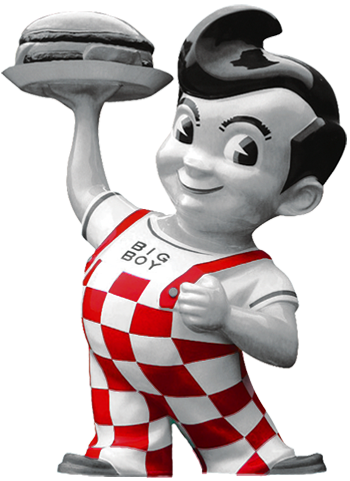Casey Stengel
 Casey Stengel in a press photo
Casey Stengel in a press photo
The only manager to ever win five straight (yes, five straight!) World Series (1949-53), Casey Stengel was called Baseball's Greatest Character by baseball author and hisorian, Marty Appel.
Casey and his wife Edna moved to 1663 Grandview Ave in Glendale and remained there the rest of their lives. As San Fernando Valley friends, Bob’s Big Boy founder, Bob Wian, was invited to watch and celebrate the New York Yankees historic run of championships.
 Bob Wian, John Elias, Casey and Edna Stengel at Stork Club
Bob Wian, John Elias, Casey and Edna Stengel at Stork Club
Casey played in the time of Babe Ruth, and under New York Giants manager John McGraw, where he learned a lot about the game. A stout .284 lifetime batting average and .393 in World Series, Casey is still better known for his antics and charisma.
After being traded from the Brooklyn Dodgers to the Pittsburgh Pirates, he returned to Ebbets Field to play his former-team. First time up to bat he razzed a hostile crowd. To a great deal of boos, Casey Stengel took a bow, and while removing his cap he produced a hidden sparrow. The bird flew around to a stadium-transformed — first with laughter and then a round of applause.
In the 1921 World Series, he did not play, but he still made the box score by getting himself ejected for arguing.
Casey Stengel was the first to hit a home run (not Babe Ruth) at the new Yankees Stadium to win Game 1 of the 1923 World Series. He hit another game-winning home run in Game 3. While rounding the bases he blew kisses to the crowd and thumbed his nose at Babe Ruth and the Yanks dugout.
 Mickey Mantle and Casey Stengel
Mickey Mantle and Casey Stengel
In 1948 as a manager of the Pacific Coast League team the Oakland Oaks, with a then 20-year-old Billy Martin, he won the minor league pennant setting the stage for a then 57-year-old man to embark upon what would be the greatest achievements of his life.
After his 3rd straight World Series Championship as the manager of the Yankees, he brought Joe DiMaggio and Mickey Mantle to play an exhibition game in Glendale, California. The Yanks lost the game 5-0 to a stunned, standing room only crowd of 5,000, but the baseball field was renamed Stengel Field (1952) in honor of the baseball immortal and Glendale resident.
 Stengel Field in Verdugo Park
Stengel Field in Verdugo Park
Following seven World Series Championships with the New York Yankees, Casey was called upon to manage the 1962 lowly expansion New York Mets. He was able to charm the press and distract them from the ineptness on field in part due to what people called Stengelese — a manner of doubletalk that served the purpose of ducking the question and amusing the questioner. On construction of the Mets’ new Shea stadium, he said, “The park is lovelier than my team.” The Amazin’ Mets surprisingly won the 1969 World Series after Stengel retired, though he was credited with the smoke screen to accompany the blast-off and presented another championship ring.
 Casey Stengel at Cooperstown
Casey Stengel at Cooperstown
Because of his age, Major League Baseball made a special exemption to the 5-year wait rule, and along with Ted Williams, Casey Stengel was inducted into the Baseball Hall of Fame (1966). His induction speech into Cooperstown was a memorable one and his quotes throughout the years are classics.
“There comes a time in every man’s life, and I’ve had plenty of them.”
“I had many years that I was not so successful as a ball player, as it is a game of skill.”
“They say that some of my stars drink whiskey, but I have found that the ones that drink milkshakes don’t win ballgames.”
Casey eventually succumbed to cancer in 1975 and is buried at Forest Lawn. Rod Dedeaux, baseball coach at the University of Southern California and a long-time friend of the Stengels, gave a eulogy and quoted Jim Murray, who had written in his column upon Stengel’s death, “Well, God is certainly getting an earful tonight.”
 Casey "playing" for the Brooklyn Dodgers
Casey "playing" for the Brooklyn Dodgers
